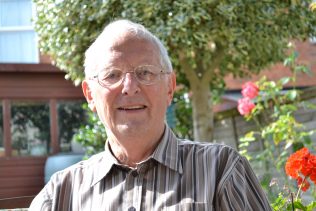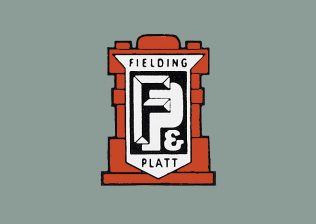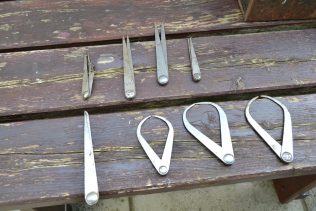Bryan Mason
From apprentice in 1948 to Machine Shop Foreman








Bryan started as an apprentice on 9 August 1948 and went onto become foreman of the Heavy Machine Shop. He worked at Fielding’s until he was made redundant on 5 November 1981.
Pythagoras’ Theorem
Bryan learnt of the apprenticeship at Fielding’s from a neighbour who lived in Carlton Road. On applying, he was taken for an interview with Mr Fairbrother, the apprentice supervisor.
The question he asked me was Pythagoras’s theorem. Funnily enough, we’d just been talking about Pythagoras’ theorem [in school] so I was able to reel it off. Then he asked why was I interested in working at Fielding’s. I said, ‘Well, I was interested in making things and had a bit of knowledge of bike repairs, which was a bit of fitting, so I thought I’d try that’”
Bryan was accepted as an apprentice and began his time at Fielding’s in the Craft Selection School under the Apprentice Instructor Bert Ravenhill. He recalls that every Monday morning for the six months that they were in the Craft School, the apprentices had a lecture on something from drills to the history of the company. Then, in the afternoon, they worked did bench work and machine work.
Bench work
Like many apprentices, Bryan recalls the steel block task. The two inch cube had to be reduced in size very accurately.
“You had a hammer a chisel and some files. It was a cross-cut chisel which you cut across the top of the block two ways, then you used the flat chisel to take the other corners off … And believe you me, when you were using a hammer and chisel if you missed the chisel and you hit your thumb you knew about it … some of them even got a large chunk of rubber and some padding so they didn’t hit their hand.”
On the bench they also made callipers and gauges from plate metal that they got from the Boiler Yard. It was then all polished up nicely, rubbed with emery, and then all put together.
After six months in the Craft School, Bryan went on to work in the Light Machine Shop (or “Top Shop” as it was known), Tool Room, and Heat Treatment before returning to the Craft School as the Junior Apprentice Instructor.
Light Machine Shop
After completing his National Service 1953-55, Bryan returned to Fielding’s. At that time, they were scaling back the Tool Room so he went into the Light Machine Shop.
He recalls that in that time the Light Machine Shop moved across the road into the Baker Street side of the factory, which was the original stock yard. They made this into a machine shop and took everything out of the old Light Machine Shop or “Top Shop” and both machine shops were put on the same floor.
Bryan ended up working on a 9C-30, a big Herbert Capstan Lathe (turret lathe) which was right on the corner of Southgate Street, underneath where the Travel Lodge now stands.
“It was right next door to the Baker Street pub, which was then called the Hauliers [Arms]. Several people used to use the Hauliers for alcoholic beverages at one time or another. There was another pub up Baker Street called The Steps, people used to use that.”
Bryan recalls working in the Light Machine Shop with three other setters: Reg Court, George Rawson and Bill Galling. Percy Taylor was the foreman in charge. However, Bryan went on to become the foreman of the Heavy Machine Shop himself, with Reg Court.
Tea Break Fun
In the morning and afternoon, Phyl and Iris would bring the tea trolley for the workers. Bread and dripping was also a favourite snack they served. “we used to toast it on the old gas fires that used to hang from the ceilings”, Bryan remembered.
At the time the workers all had their own mugs and Bryan recalls a humorous occasion on which someone played a practical joke on his colleague Dilly Trenfield.
He used to be dashing about and he grabbed hold of his cup one day and nearly took his finger off because someone had nailed his cup to the bench, which was a bit of a disaster for him because he couldn’t get any tea!”
Bryan also took part in the fun and recalls how he “encouraged” the Tool Room’s foreman, Ray Howse to get a new mug.
Ray’s tea can was very dirty so Bryan put a couple of little holes in the rim with centre punch he had. So Ray threw his old tea can away which was “very nice to see” remembers Bryan, “coz the old one was more rust than anything”.
Happy memories of Fielding days!
If you remember Bryan, the Light Machine Shop, or have any other memories which’ve been sparked by this page please share them by adding a comment below.





Comments about this page
Hi Colin! Many thanks for your comments on your time at Fieldings. They will bring back memories to many people. I certainly still have my brass handle screwdriver amongst other hand tools. Many still used today. John B
Hello Bryan,
It’s a long, long time since I saw you. I think it would have been at Highleadon where you used to visit to buy tomatoes and produce from my father.
Between 1967 and 1973, I worked in the light and heavy machine shops working opposite shifts at different times with Charlie Stearn, Norman Crampton and another man whose name I can’t recall at present but he and I worked on the large horizontal borer in the old heavy machine shop.
I finished up working on the “new” Asquith ram borer with Ernie “Sticky” Gill for over 12 months. That was the largest machine tool in the factory.
One memorable moment was when a very large casting from an extrusion press slipped from the slings of the overhead crane and moved and seriously damaged the machine bed. That was an interesting couple of weeks! It bent the casting as well and because of its value it had to be re-machined and partially re-designed.
A few months later I left the company to do other interesting things but the Fielding apprenticeship has always been a valuable asset.
I still have all of the tools that I made in the craft school (toolbox, parallels, machine jack, etc.) l still use some of them such as tap wrenches and a large screwdriver with fluted Permali handle and tempered silver steel shaft with brass ferrule. I wonder if anyone remembers making one of those and how many might still exist? Recently, I found some angle gauges that I made in the apprentice school over 50 years ago. They were in a grease-filled cigar tin but in pristine condition and still wrapped in one of those red cloth ‘wipers’ that I am sure you will recall, that were in abundance throughout the factory.
I have many fond memories of my time at Fielding and Platt, the practical jokes and culture were both amusing and character building but by today’s standards not politically correct at all! However, I am glad and fortunate to have experienced it.
Best wishes
Colin Robertshaw
Hi Brian, thanks for your comment and memories – I’ve passed your details onto the team who are continuing to make the recordings with F&P employees and they’ll be in touch soon to record your memories of the Fielding days! Look forward to hearing them. Cheers, Ollie
Hi Bryan! I worked in the light machine shop from about 1964 till 1972? I would like to record about my time there. Regards, Brian Jay
Add a comment about this page